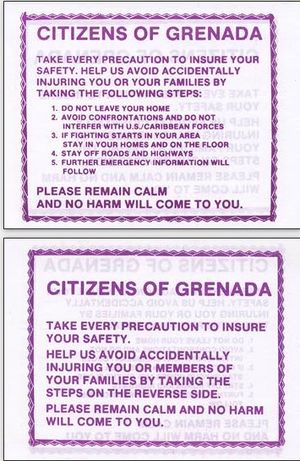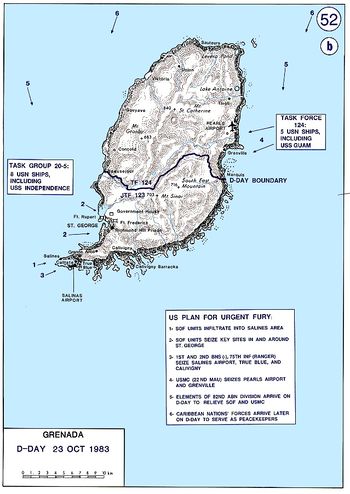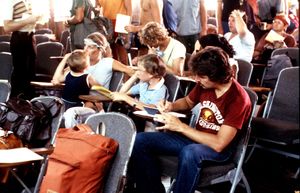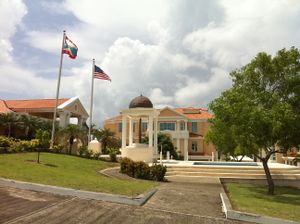غزو گرينادا
| عملية الغضب العاجل Operation Urgent Fury | |||||||
|---|---|---|---|---|---|---|---|
| جزء من الحرب الباردة | |||||||
 مروحية سيكورسكي CH-53D Sea Stallion helicopter of the U.S. Marine Corps hovers above the ground near an abandoned Soviet ZU-23-2 anti-aircraft weapon during the invasion of Grenada in 1983. | |||||||
| |||||||
| المتحاربون | |||||||
|
| |||||||
| القادة والزعماء | |||||||
|
|
| ||||||
| القوى | |||||||
|
United States: 7,300 CPF: 353 |
Grenada: ~1,200 Cuba: 780[3] Soviet Union: 49 North Korea: 24[1] East Germany: 16 Bulgaria: 14 Libya: 3 or 4 | ||||||
| الضحايا والخسائر | |||||||
|
United States: 19 killed[4] 116 wounded[3] 9 helicopters lost |
Grenada: | ||||||
|
| |||||||
غزو گرينادا كان غزواً في 1983 بقيادة الولايات المتحدة للدولة الجزيرة في الكاريبي گرينادا، التي كان عدد سكانها يناهز 91,000 وتقع على بعد 160 كم شمال ڤنزويلا، وقد أسفر عن نصر أمريكي في غضون أسابيع. Codenamed Operation Urgent Fury, it was triggered by the internal strife within the People's Revolutionary Government that resulted in the house arrest and the execution of the previous leader and second Prime Minister of Grenada Maurice Bishop, and the establishment of a preliminary government, the Revolutionary Military Council with Hudson Austin as Chairman. The invasion resulted in the appointment of an interim government, followed by democratic elections in 1984. The country has remained a democratic nation since then.[ممن؟]
Grenada gained independence from the United Kingdom in 1974. The leftist New Jewel Movement seized power in a coup in 1979 under Maurice Bishop, suspending the constitution and detaining a number of political prisoners. In 1983, an internal power struggle began over Bishop's relatively moderate foreign policy approach, and on 19 October, hard-line military junta elements captured and executed Bishop, his partner Jacqueline Creft, along with three cabinet ministers and two union leaders. Subsequently, following appeals by the Organization of Eastern Caribbean States and the Governor-General of Grenada, Paul Scoon, the Reagan Administration in the U.S. quickly decided to launch a military intervention. From the U.S. perspective, a justification for the intervention was in part explained as "concerns over the 600 U.S. medical students on the island" and fears of a repeat of the Iran hostage crisis.
The U.S. invasion began six days after Bishop's death, on the morning of 25 October 1983. The U.S. Army's Rapid Deployment Force (1st, 2nd Ranger Battalions and 82nd Airborne Division Paratroopers), U.S. Marines, U.S. Army Delta Force, and U.S. Navy SEALs and other combined forces constituted the 7,600 troops from the United States, Jamaica, and members of the Regional Security System (RSS)[7] defeated Grenadian resistance after a low-altitude airborne assault by the 75th Rangers on Point Salines Airport on the southern end of the island, and a Marine helicopter and amphibious landing occurred on the northern end at Pearl's Airfield shortly afterward. The military government of Hudson Austin was deposed and replaced by a government appointed by Governor-General Paul Scoon until elections were held in 1984.
The invasion was criticized by several countries including Canada. British Prime Minister Margaret Thatcher privately disapproved of the mission and the lack of notice she received, but publicly supported the intervention.[8] The United Nations General Assembly, on 2 November 1983 with a vote of 108 to 9, condemned it as "a flagrant violation of international law".[9] Conversely, it enjoyed broad public support in the United States[10] and, over time, a positive evaluation from the Grenadian population, who appreciated the fact that there had been relatively few civilian casualties, as well as the return to democratic elections in 1984.[11][بحاجة لمصدر أفضل][12] The U.S. awarded more than 5,000 medals for merit and valor.[13][14]
The date of the invasion is now a national holiday in Grenada, called Thanksgiving Day, which commemorates the freeing, after the invasion, of several political prisoners, who were subsequently elected into office. A truth and reconciliation commission was launched in 2000 to re-examine some of the controversies of the era; in particular, the commission made an unsuccessful attempt to find Bishop's body, which had been disposed of under Hudson Austin's orders, and never found.
For the U.S., the invasion also highlighted problematic issues with communication and coordination between the different branches of the United States military when operating together as a joint force, contributing to investigations and sweeping changes in the form of the Goldwater-Nichols Act and other reorganizations.
خلفية
الهجوم الجوي على پوينت سالينز
رد الفعل في الولايات المتحدة
ردود الأفعال العالمية
الأعقاب
آخرون
October 25 is a national holiday in Grenada, called Thanksgiving Day, to commemorate the invasion.
انظر أيضاً
الهامش
- ^ أ ب "Operation Urgent Fury"' GlobalSecurity.org
- ^ Clarke, Jeffrey J. Operation Urgent Fury: The Invasion of Grenada, October 1983 (PDF). United States Army.
- ^ أ ب ت Cole, Ronald (1997). "Operation Urgent Fury: The Planning and Execution of Joint Operations in Grenada" (PDF). Retrieved 9 November 2006.
- ^ "Medals Outnumber G.I.'S In Grenada Assault". The New York Times. 30 March 1984.
- ^ "PBS.org:The Invasion of Grenada".
- ^ "Soldiers During the Invasion of Grenada". CardCow Vintage Postcards.
- ^ "Caribbean Islands – A Regional Security System". country-data.com.
- ^ Charles Moore, Margaret Thatcher: At her Zenith (2016) p. 130.
- ^ "United Nations General Assembly resolution 38/7". United Nations. 2 November 1983. Retrieved 5 March 2016.
- ^ Magnuson, Ed (21 November 1983). "Getting Back to Normal". Time.
- ^ Associated Press report in 2012, printed in Fox News
- ^ Steven F. Hayward. The Age of Reagan: The Conservative Counterrevolution: 1980–1989. Crown Forum. ISBN 1-4000-5357-9.
- ^ Tessler, Ray (19 August 1991). "Gulf War Medals Stir Up Old Resentment". Los Angeles Times. p. 2. Retrieved 30 June 2013.
- ^ "Overdecorated". Time. 9 April 1984.
المصادر الرئيسية
- Grenada Documents, an Overview & Selection, DOD & State Dept, Sept 1984, 813 pages.
- Grenada, A Preliminary Report, DOD & State
- Joint Overview, Operation Urgent Fury, 1 May 1985, 87 pages
للاستزادة
- Adkin, Mark (1989). Urgent Fury: The Battle for Grenada: The Truth Behind the Largest U.S. Military Operation Since Vietnam. Lexington Books. ISBN 0-669-20717-9.
- Brands, H. W., Jr. (1987). "Decisions on American Armed Intervention: Lebanon, Dominican Republic, and Grenada". Political Science Quarterly. 102 (4): 607–624. JSTOR 2151304.
{{cite journal}}: CS1 maint: multiple names: authors list (link) - Cole, Ronald H. (1997). Operation Urgent Fury: The Planning and Execution of Joint Operations in Grenada, 12 October - 2 November 1983 (PDF). Washington, D.C.
{{cite book}}: CS1 maint: location missing publisher (link) Official Pentagon study. - Gilmore, William C. (1984). The Grenada Intervention: Analysis and Documentation. New York: Facts on File. ISBN 0-87196-920-3.
- Moore, Charles. Margaret Thatcher: At her Zenith in London, Washington and Moscow (2016) pp. 117–35.
- Payne, Anthony. "The Grenada crisis in British politics." The Round Table 73.292 (1984): 403–410. online
- Russell, Lee (1985). Grenada 1983. London: Osprey. ISBN 0-85045-583-9., A military history.
- Williams, Gary. US-Grenada Relations: Revolution and Intervention in the Backyard (Macmillan, 2007).
وصلات خارجية
- Invasion of Grenada and Its Political Repercussions from the Dean Peter Krogh Foreign Affairs Digital Archives
- Operation: Urgent Fury, Grenada
- The 1983 Invasion of Grenada, Operation: Urgent Fury
- "Grenada, Operation Urgent Fury (23 October – 21 November 1983)"—Naval History & Heritage Command, U.S. Navy
- Grenada—a 1984 comic book about the invasion written by the CIA.
- Articles with specifically marked weasel-worded phrases from November 2017
- All pages needing factual verification
- Wikipedia articles needing factual verification from January 2017
- CS1 maint: location missing publisher
- 1983 in Grenada
- 1983 in the United States
- Airborne operations
- Cold War conflicts
- Communism in Grenada
- Conflicts in 1983
- Cuba–United States relations
- Grenada–United States military relations
- History of Grenada
- تاريخ الولايات المتحدة (1980–1991)
- غزوات by the United States
- غزوات of Grenada
- تجريدات عسكرية أمريكية
- عمليات القوات الخاصة الأمريكية
- Reagan administration controversies
- United States Army Rangers
- United States Marine Corps in the 20th century
- United States–Caribbean relations
- Wars involving Antigua and Barbuda
- Wars involving Barbados
- Wars involving Cuba
- Wars involving Dominica
- Wars involving Grenada
- Wars involving Jamaica
- Wars involving Saint Lucia
- Wars involving Saint Vincent and the Grenadines
- حروب الولايات المتحدة
- غزوات
- حروب بالوكالة
- October 1983 events
- November 1983 events
- December 1983 events







